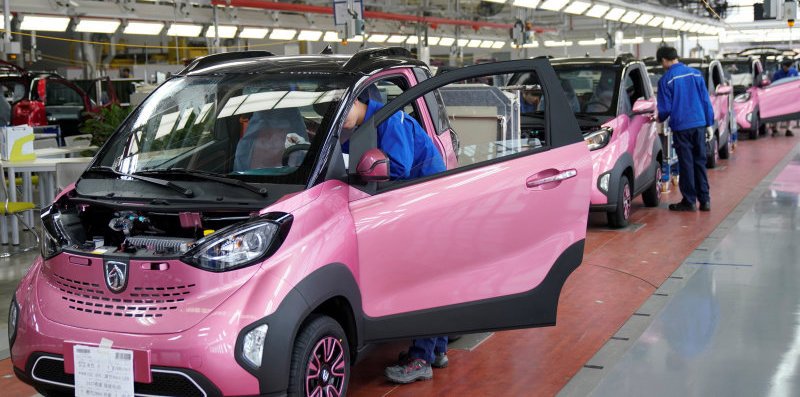China says it's scrapping ownership limits on foreign automakers

China is scrapping a limit on foreign ownership of automotive ventures, representing a major shift from policy in place for more than two decades, even as trade tensions simmer between Washington and Beijing.
The country will remove foreign ownership caps on companies making fully electric and plug-in hybrid vehicles in 2018, for makers of commercial vehicles in 2020 and the wider car market by 2022, China's state planner said in a statement.
The move marks the latest twist in a see-saw week for Chinese trade. The country slapped a temporary fee on U.S. sorghum on Tuesday after the U.S. banned American companies from selling parts to Chinese phone maker ZTE Corp on Monday.
It also signals the end of a rule put in place in 1994, in which the world's largest auto market limited foreign carmakers to owning no more than a 50 percent share of any local venture.
The policy was implemented to help domestic carmakers to compete against more advanced international rivals.
Analysts said the main beneficiaries, at least in the short term, would be manufacturers focused on new-energy vehicles, including U.S. electric carmaker Tesla, which has been seeking to set up its own plant in Shanghai.
Tesla chief Elon Musk last month that China's tough auto rules for foreign businesses created an uneven playing field as scores of local and international companies compete for a slice of China's fast-growing market for "green" cars.
Tesla was not immediately available to comment on Tuesday.
The looser rules are likely to raise pressure on domestic carmakers, potentially hitting the likes of Warren Buffett-backed BYD Co.
Traditional automakers will need to wait longer for any direct impact and could face more risks than opportunities in ditching their joint venture structures, said James Chao, Asia-Pacific chief at consultancy IHS Markit.
"Foreign companies may already be in a box (in China)," said Chao, adding that the joint venture structure was now so ingrained that many might not want to change it.
"While getting a bigger share could be advantageous in terms of boosting profits, they may actually be already too dependent on their Chinese partners to sever those ties."
A senior General Motors executive last week said that the U.S. carmaker, even without ownership caps, would not cut ties with local partner SAIC Motor Corp. The source, who asked to remain anonymous because of the sensitivity of the matter, also said that GM would not be as successful in China on its own.
Last week GM said that its "growth in China is a result of working with our trusted joint venture partners".
Japan's Nissan Motor Co said in a statement that it would "monitor how any specific policies develop and will plan accordingly".
Honda said its China business had grown on the back of strong local tie-ups. "At the moment we have no plans to change our capital relationship," a Honda spokesman said.
China will also scrap limits on foreign ownership in the shipbuilding and aircraft industries in 2018, the National Development and Reform Commission (NDRC) said.
Airbus and Boeing did not immediately respond to Reuters' requests for comment.
The highly symbolic moves in autos come after President Xi Jinping said last week that the country would scrap ownership limits "as soon as possible," exciting global auto brands even as China and the United States spar over trade tariffs.
China, which said the easing of autos rules is unrelated to its trade dispute with the United States, is keen to portray itself as open for business. Its ties with the world's largest economy, though, are becoming increasingly fraught.
The United States has banned American companies from selling parts to telecoms equipment maker ZTE Corp for seven years, creating a new fissure in Sino-U.S. ties.
Related News


